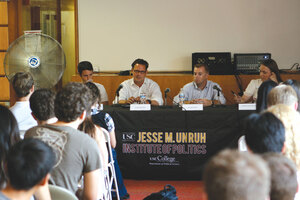Experts, students analyze Obama presidency so far
The same day a CNN public opinion poll announced that the president’s approval rating had dropped to 53 percent, the Jesse M. Unruh Institute of Politics held its first Students Talk Back forum of the semester, titled “Obama Overview: How’s he doing?”
At the forum, held in the EVK Common Room Wednesday, students and faculty gathered with experts from the 2008 Democratic and Republican presidential campaigns to discuss the Obama presidency.

Backtalk · Panelists Jon Carpenter, Craig Schirmer, Joseph Clark and Andrea Jones Rivera discuss the progress of the Obama presidency as a part of the Students Talk Back forum in the EVK Common Room. - Amaresh Sundaram Kuppuswamy | Daily Trojan
“I think these forums and these debates are important so people can not only articulate their views, but strengthen them,” said Alexa Ekman, president of the USC College Republicans, who attended the event.
Students convened with expert panelists Craig Schirmer, a senior advisor of the Obama/Biden campaign, and Andrea Jones Rivera, the California state director of the McCain/Palin campaign. Student panelists Jon Carpenter, former president of the USC College Democrats, and Joseph Clark, a representative from the USC College Republicans, also presented their political views at the event.
Dan Schnur, director of the Unruh Institute, and Daily Trojan Managing Editor Dan Loeterman, moderated the lunch panel discussion.
“Dan [Schnur] has an incredible ability to pull together people from across the political spectrum and help educate students on important issues to our country,” Rivera said.
The forum covered the full gamut of issues on the president’s agenda, from the economic stimulus to health care reform and even the wars in Iraq and Afghanistan.
“The president has a lot of challenges ahead and he’s starting to meet them head-on,” Schirmer said during the forum.
Rivera said she thought President Obama needs to balance which issues he wants to make an impact on with the issues that he needs to make an impact on. Rivera added that she thought Obama should have stayed in the United States for longer than he did after the election to make some progress on his agenda, before choosing to go overseas.
“Obama has a larger-than-life personality, the likes of which we haven’t seen since JFK,” Rivera said.
On health care reform, Rivera said she thought Obama started out on the right foot by meeting with senators and representatives from both sides of the aisle, but that he did not set the right tone for the specific items he wanted to see accomplished.
The current backlash on health care reform is based on the
widespread view that the current administration has taken on too much, Rivera said.
Obama was elected on the promise of change, according to Clark, but instead the country found itself with a growing deficit and an expansion of government into banking and the auto industry.
Schirmer said it seemed Obama was starting the process of making changes.
“[Obama]’s beginning to lay down the markers of changing Washington,” he said.
He noted Obama expanded the national debt to prevent a full-fledged depression, and that health care reform seems to be close to fruition.
The president plans to address both houses of Congress next week with his specific goals for health care reform.
“He’s a guy that finds a way to get things done,” Schirmer said, adding that Obama will need to present a clear, compelling message to garner enough support to back the health care legislation.
Despite the global financial crisis, conservatives are willing to spend money for the war on terror, as long as there is a clear vision in the ongoing fight, according to republicans Rivera and Clark.
“President Obama is in a unique position in that he can reach out to other countries, especially in the Middle East,” Rivera said.
The president is working with Gen. Stanley McChrystal, who commands US and NATO troops in Afghanistan, to devise a new strategy for the next year in the country, Schirmer said, with the hopes that progress would be made before liberals become disenchanted with the war.
“The administration needs to bring political muscle this fall,” he said.
After the panel discussion concluded, both the students and experts in attendance said they thought the event was a good way to spark discussion about important political issues.
“The country is faced with great problems and it is always good to engage in political dialogue, no matter what your ideological perspective,” Schirmer said, following the forum.
Rivera agreed, noting that it is particularly important to have students involved in discussions like the Students Talk Back forum.
“This is the next generation of young leaders and it’s extremely important to help them get involved,” Rivera said. “It’s important to have a discussion about politics without throwing a table across the room.”
Schnur said he was pleased by the high student turnout, especially since it was the first panel of the semester.
“From the time we started these lunches last fall, I’ve been pleasantly surprised and tremendously encouraged by the level of student turnout and participation,” Schnur said. “The fact that we were able to start out today with such a strong turnout and such a valuable discussion bodes very well for the semester.”
The Students Talk Back forums will continue every Wednesday until the end of the semester. The next two forum topics are health care reform and Afghanistan.
